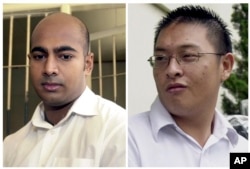Indonesian officials said Friday they are uncertain about the timing of planned executions of foreign prisoners from half a dozen nations, who have been found guilty of drug charges. Jakarta is under increasing pressure, particularly from Australia, which could have broader economic and political repercussions.
A spokesman for Indonesia’s attorney general Friday said there is no clear timetable for the execution of the 11 prisoners being held at a maximum detention facility on Nusakambangan Island.
The prisoners, from Australia, Brazil, the Philippines, France, Ghana, Nigeria and Indonesia are awaiting the firing squad after being found guilty of drug smuggling or involvement in illegal drugs.
Tough stand
Indonesia’s President Joko Widodo has taken a tough stand in calling for the death penalty, saying the aim is to protect Indonesia’s youth. The government has declared a “state of emergency” in what it sees as a war against narcotics.
Earlier this year, the government executed six convicted drug traffickers from Brazil, Malawi, Nigeria, the Netherlands and Vietnam, as well as an Indonesian woman.
That caused Brazil and the Netherlands to withdraw their ambassadors. Foreign countries have since lobbied intensely for Indonesia to rescind the latest round of executions, arguing against the harsh punishment. But so far none have won a reprieve.
Rights groups such as Amnesty International also have been critical, saying the government’s apparent refusal to consider clemency on a case by case basis is contrary to the country’s constitution.
Under review
At least two prisoners, a 49-year-old Brazilian, Rodrigo Gularte, and a 30-year-old Filipino migrant worker, Jane Fiestal Veloso, who says she was tricked into smuggling drugs in 2010, are having their cases reviewed.
Philippines’ Department of Foreign Affairs spokesman, Charles Jose, told Philippine media, he welcomed the judicial review.
“We are hopeful now that the case has been endorsed [for review by] the Supreme Court, so that will mean that there will be no execution until the judicial review has been completed and as long as the case is still being heard," said Jose.
The Brazilian’s execution may be delayed pending a medical review over the state of his mental health. The Brazilian and Indonesian ambassadors in each country's capital have been recalled home, in part because of the current dispute but also as a result of Indonesia's execution of another Brazilian prisoner in a different drug-trafficking case.
Others facing the death sentence include a French national, Serge Areski Atlaoui, also pleading for a judicial review; a Ghanaian, Martin Anderson, and three Nigerian nationals, Rahmeen Agbaje Salami, Silvester Obiekwe and Okwudili Ayotanze. There is also an Indonesian national, Zainal Abidin.
In a statement to VOA, Nigerian Embassy officials in Jakarta said all diplomatic steps had been taken to spare the lives of the three men as well as appeals to the Indonesian Government.
Tense relationship
Australia has been particularly vocal in pleading for its two nationals, Andrew Chan, and Myuran Sukumaran, to be spared, leading to growing anti-Australian feeling in Indonesia and elsewhere in Asia.
Malaysian former Information Minister, Zainuddin Maidin, this week called on Indonesia’s President, “to teach Australia how to behave towards Asia, specifically ASEAN or the Association of South East Asian Nations.”
Australian business and investors in Asia are fearful of a backlash to Canberra’s high profile stance in a region where quiet diplomacy is typically preferred.
Australia-Indonesia Business Council president, Debnath Guharoym says the Australian business community is disheartened over Indonesia’s steps towards the executions.
“If you've got ministers meeting to talk about an issue raised by Australia and the ASEAN reaction to it; that in itself says that ASEAN is not happy with the way things are with Australia today. And that’s not helpful to the relationship and we acknowledge that," said Guharoym.
Both Australia’s Prime Minister Tony Abbott and the U.N. Secretary-General Ban Ki-moon have appealed to the country not to execute prisoners for drug crimes. Indonesia resumed capital punishment in 2013 after a five year hiatus.












